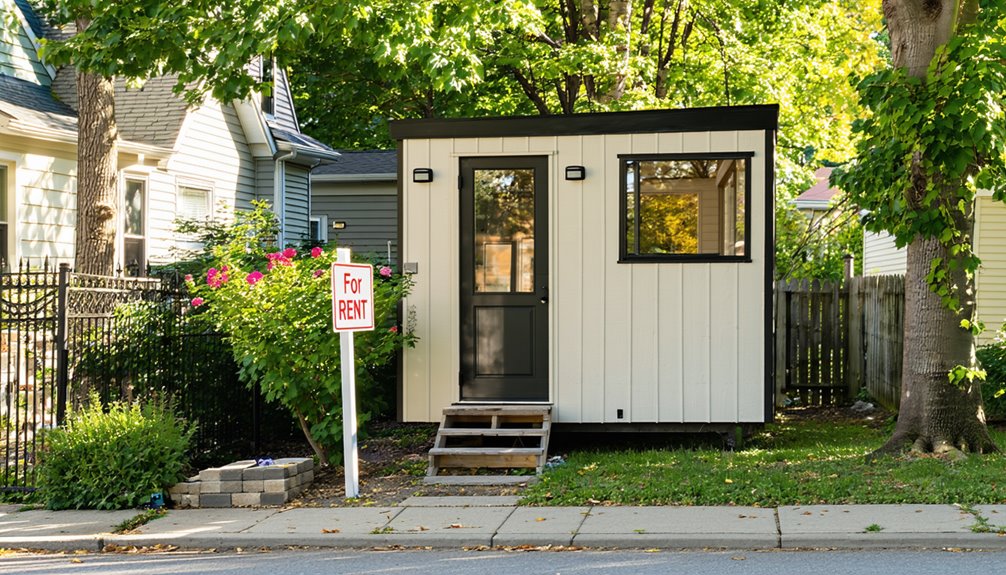As a real estate agent, you know the environment is shifting. Accessory Dwelling Units (ADUs) are gaining traction, especially in zoning-friendly areas. These versatile spaces offer unique benefits for buyers, from increased property value to rental income potential. With demand for affordable housing on the rise, understanding how to navigate the evolving regulations surrounding ADUs can set you apart. Are you ready to uncover the strategies that will position you ahead in this growing market?
Understanding Accessory Dwelling Units (ADUs) and Their Benefits
Accessory Dwelling Units (ADUs) are reshaping the environment of residential living, offering innovative solutions for housing affordability and lifestyle flexibility.
These secondary units, whether internal, attached, or detached, provide independent living spaces while maintaining tenant privacy. One of the key ADU benefits is their ability to generate rental income, helping homeowners offset mortgage payments or support fixed incomes. Additionally, homeowners can rent out a casita while living in their main house, further enhancing their financial stability. In areas with high demand, the supply fluctuations can make ADUs a crucial option for increasing available housing.
With sizes ranging from 600 to 1,000 square feet, ADU designs cater to smaller households, making them ideal for students or older adults. Additionally, converting existing spaces like garages into ADUs is a cost-effective approach to housing shortages.
Whether you’re looking to downsize or create guest accommodations, ADUs enhance your living options and increase property value, making them a smart investment.
Navigating Zoning and Regulatory Changes for ADU Development
How can homeowners effectively navigate the complex terrain of zoning and regulatory changes when developing Accessory Dwelling Units (ADUs)?
First, familiarize yourself with local zoning challenges, as many jurisdictions impose specific standards, such as owner-occupancy requirements and size limits. In some states, the dual agency laws can also affect the representation of clients interested in ADU development.
Understanding the permitting processes is key; you’ll need to make certain your ADU complies with site-specific regulations like setbacks and height restrictions. Additionally, the rise of affordable housing supply through ADUs has made many local governments more supportive of their development.
Engage with local planners to clarify any nuances in regulatory compliance, especially concerning parking mandates and occupancy restrictions.
Remember, some regions may even have programs to legalize pre-existing ADUs, so ask about those options.
Capitalizing on Market Opportunities for ADUs as a Real Estate Agent
Maneuvering the complexities of zoning and regulatory changes for ADU development sets the stage for real estate agents to seize market opportunities. By leveraging effective market strategies, you can highlight the significant investment potential of properties with ADUs. With the ADU market projected to grow at a staggering CAGR of 18.6% through 2030, there’s never been a better time to engage clients seeking versatile living spaces. This growth is largely driven by housing affordability, emphasizing the demand for affordable housing solutions. Understanding market trends will allow you to tailor your approach and present compelling data to potential buyers. Emphasize the financial benefits, such as increased property value and rental income opportunities. Target buyers interested in multigenerational living or those adapting to remote work needs. As consumer preferences shift, positioning yourself as an ADU expert can differentiate you in a competitive marketplace, ultimately boosting your sales and client satisfaction.
Frequently Asked Questions
How Do ADUS Impact Property Taxes for Homeowners?
ADUs significantly impact property taxes, increasing your assessed value and creating property tax implications. However, as a homeowner, you benefit from potential rental income that can offset these costs, making ADUs a financially savvy investment.
What Are Common Financing Options for Building ADUS?
You’ve got several financing options for building ADUs, like construction loans for new builds and renovation financing for existing structures. These choices can help you maximize your investment while accommodating your financial situation effectively.
Can ADUS Be Used for Short-Term Rentals?
Yes, ADUs can be used for short-term rentals, but you’ll need to navigate local short-term regulations. By complying, you can maximize your rental income, but be aware of potential restrictions and management complexities.
What Maintenance Considerations Are Unique to ADUS?
When maintaining ADUs, consider tenant responsibilities and utility management. Frequent inspections and repairs are critical due to higher occupancy wear. Focus on safety devices, plumbing, and HVAC systems to guarantee comfort and compliance for your tenants.
How Do ADUS Affect Neighborhood Aesthetics and Property Values?
ADUs can enhance neighborhood design by promoting aesthetic harmony, but poorly integrated units may disrupt visual coherence. Thoughtful design is significant to maintain property values while ensuring these dwellings blend seamlessly into their surroundings.
References
- https://www.hcd.ca.gov/policy-and-research/accessory-dwelling-units
- https://www.backyardunlimited.com/accessory-dwelling-units/benefits/
- https://singlefamily.fanniemae.com/originating-underwriting/mortgage-products/accessory-dwelling-units
- https://www.hcd.ca.gov/policy-research/docs/understandingadusimportance.pdf
- https://www.homes.com/blog/what-is-an-adu/
- https://www.sa.gov/Directory/Departments/NHSD/Affordable-Housing/ADU-Program/Benefits
- https://snapadu.com/blog/8-benefits-of-a-backyard-home/
- https://www.aarp.org/livable-communities/housing/info-2019/adus-are-good-for-people-and-places.html
- https://www.investopedia.com/terms/a/accessory-dwelling-unit-adu.asp
- https://www.planning.org/knowledgebase/accessorydwellings/

